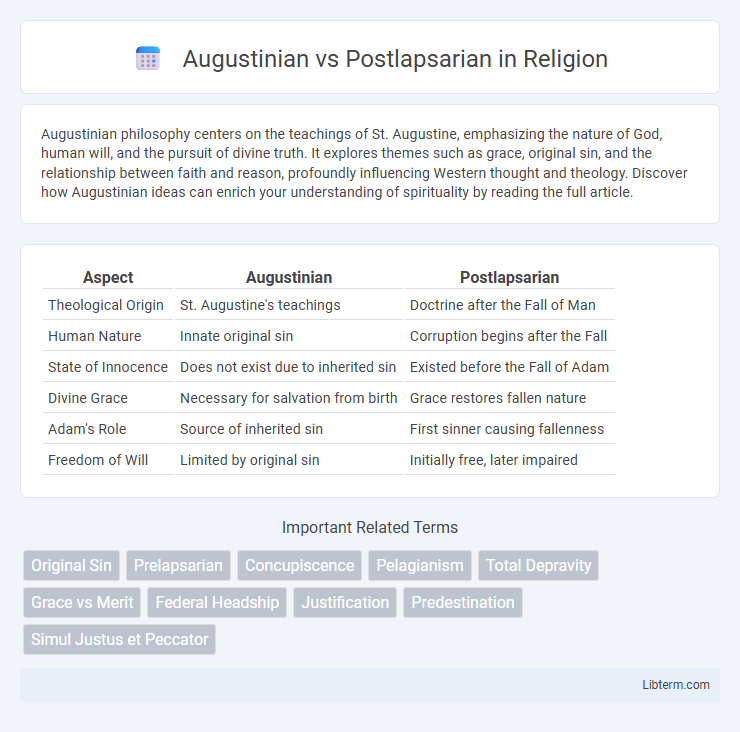Augustinian philosophy centers on the teachings of St. Augustine, emphasizing the nature of God, human will, and the pursuit of divine truth. It explores themes such as grace, original sin, and the relationship between faith and reason, profoundly influencing Western thought and theology. Discover how Augustinian ideas can enrich your understanding of spirituality by reading the full article.
Table of Comparison
| Aspect | Augustinian | Postlapsarian |
|---|---|---|
| Theological Origin | St. Augustine's teachings | Doctrine after the Fall of Man |
| Human Nature | Innate original sin | Corruption begins after the Fall |
| State of Innocence | Does not exist due to inherited sin | Existed before the Fall of Adam |
| Divine Grace | Necessary for salvation from birth | Grace restores fallen nature |
| Adam's Role | Source of inherited sin | First sinner causing fallenness |
| Freedom of Will | Limited by original sin | Initially free, later impaired |
Introduction: Defining Augustinian and Postlapsarian Perspectives
Augustinian perspective asserts that humanity's fallen nature originates from Adam's original sin, emphasizing inherited guilt and innate depravity. Postlapsarian view situates human nature and divine grace within the context of the Fall, highlighting a temporal distinction between creation and the fall into sin. These theological frameworks shape doctrines on sin, grace, and redemption in Christian thought.
Historical Background: The Origins of Each Doctrine
Augustinian theology, emerging from St. Augustine of Hippo in the 4th and 5th centuries, shaped the doctrine of original sin, emphasizing humanity's fallen state and inherent sinfulness after Adam's transgression. Postlapsarian doctrine, which developed later within Reformation theology, specifically addresses the human condition after the Fall, contrasting with Prelapsarian views that focus on humanity before sin entered the world. The historical origins of these doctrines reflect evolving interpretations of biblical texts, particularly Genesis, influencing Christian anthropology and soteriology throughout church history.
Core Beliefs of Augustinian Theology
Augustinian theology centers on the doctrines of original sin and total depravity, emphasizing humanity's innate corruption and the necessity of divine grace for salvation. It asserts that human will is fundamentally weakened and incapable of choosing good without God's intervention, highlighting predestination as a key tenet. This framework contrasts with postlapsarian views by stressing that the fall has irrevocably altered human nature, making redemption solely dependent on God's sovereign grace.
Key Tenets of Postlapsarian Thought
Postlapsarian thought emphasizes the fallen state of humanity after Adam and Eve's transgression, highlighting inherent sinfulness and moral corruption as fundamental conditions of human nature. It asserts that divine justice and grace are necessary responses to human depravity, underscoring the role of God's sovereignty in salvation history. This framework contrasts with the unfallen nature posited by Augustinian doctrine, focusing instead on the consequences of the Fall that shape human responsibility and divine intervention.
Human Nature: Augustinian vs Postlapsarian Views
Augustinian views on human nature emphasize inherent original sin, asserting that humans possess a fallen nature prone to evil due to Adam's transgression, necessitating divine grace for redemption. Postlapsarian perspectives acknowledge the loss of original righteousness but often stress the retained capacity for moral decision and free will despite the human propensity toward sin. These contrasting views shape theological understandings of human responsibility, sinfulness, and the need for salvation within Christian doctrine.
Original Sin: Divergent Interpretations
Augustinian theology views Original Sin as the inherited guilt and corruption from Adam's transgression, emphasizing total depravity and the necessity of divine grace for salvation. Postlapsarian perspectives interpret Original Sin primarily as the condition resulting from the Fall, highlighting the moral and spiritual consequences rather than inherited guilt. These divergent interpretations shape doctrines of human nature, grace, and redemption within Christian theology.
Grace and Salvation: Contrasting Approaches
Augustinian theology emphasizes grace as an unmerited gift essential for salvation, asserting that human will is inherently corrupted by original sin and incapable of choosing God without divine intervention. In contrast, Postlapsarian views often allow for human cooperation with grace, suggesting that although sin has weakened the will, individuals retain some capacity to respond to God's offer of salvation. The divergence highlights Augustine's doctrine of irresistible grace versus Postlapsarian beliefs in conditional election and synergistic salvation.
The Role of Free Will
Augustinian theology emphasizes the bondage of the will after the Fall, asserting that human free will is weakened and cannot achieve salvation without divine grace. Postlapsarian views recognize human free will as impaired but still capable of cooperating with God's grace in the process of salvation. Both perspectives highlight the critical interaction between divine sovereignty and human choice in the doctrine of salvation.
Influence on Modern Christian Thought
Augustinian theology, emphasizing original sin and predestination, profoundly shapes modern Christian views on human nature and divine grace, reinforcing doctrines of salvation and moral accountability. Postlapsarian perspectives, interpreting humanity's fallen state after the original sin, influence contemporary understandings of free will, sin, and redemption within various Protestant traditions. Both frameworks contribute to ongoing theological debates and ethical discussions in modern Christianity.
Conclusion: Lasting Impact and Theological Significance
Augustinian and Postlapsarian perspectives profoundly shape Christian anthropology and soteriology by defining human nature's state before and after the Fall. The Augustinian view emphasizes original sin's pervasive impact, underpinning doctrines of total depravity and the necessity of divine grace for salvation. Postlapsarian theology highlights humanity's altered condition post-Fall, influencing interpretations of free will and moral responsibility that continue to inform contemporary theological debates.
Augustinian Infographic

 libterm.com
libterm.com